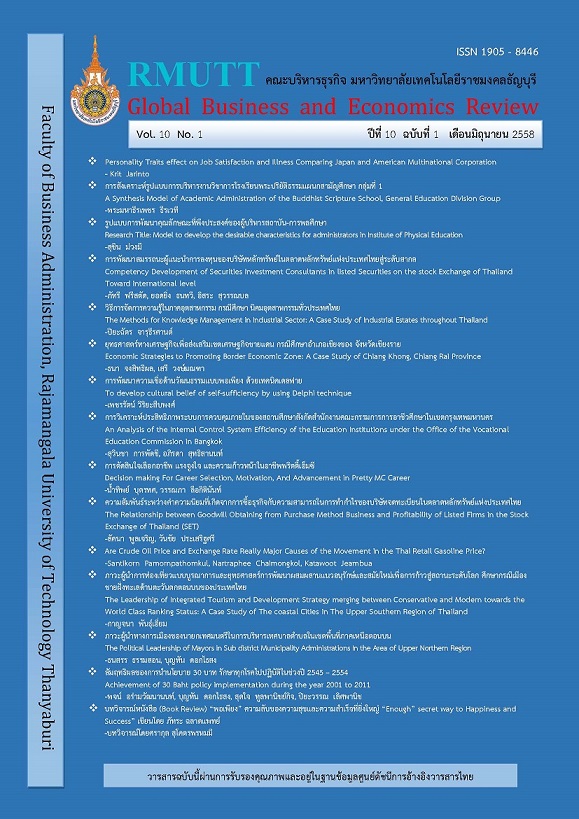THE METHODS FOR KNOWLEDGE MANAGEMENT IN INDUSTRIAL SECTOR: A CASE STUDY OF INDUSTRIAL ESTATES THROUGHOUT THAILAND
Keywords:
Knowledge Management, Problems and Obstacles of Knowledge Management DevelopmentAbstract
The objectives of this research are 1) to investigate a suitable knowledge management method for factories in industrial estates throughout Thailand, 2) to study a general situation of knowledge management in organizations including problems and obstacles of knowledge management for factories in industrial estates throughout Thailand, and 3) to study factors affecting to knowledge management methods or tools and problems and obstacles of knowledge management development. The sample of study was consisted of top and intermediate levels of executives and knowledge-management managers who were currently active in knowledge management tasks from the successful top-listed factories of 290 factories. Two persons of each factory were carefully chosen from top-to-intermediate levels of executives and knowledge-management managers having the total respondents of 580 people. Questionnaires were used as a tool for data collection. Statistical analyses in this research were analysis of variance (ANOVA) and LSD for comparison of differences of data in pairs. From the results, it was found that most of the factories have used human resource developments as a part of knowledge management method. Most of the factories have done knowledge management for 1-5 years aiming for human-resource development and official arrangement for knowledge management activities. Also, most of the factories had problems and obstacles on knowledge-management developments in intermediate levels, i.e., top-level executives have not continuously supported or not participated in knowledge-management. Results of ANOVA were shown that the knowledge management method was not significantly different for different sizes of factories and understandings of executives in knowledge management in industrial sector.
References
ฐิติมา ธรรมบำรุง. (2555). กรณี ธนาคาร Negara Malaysia. สืบค้นจาก http://www.stks.or.th/th/knowledge-bank/27-km/267-km-negara-malaysia.html
ดำรง ณ น่าน. (2555). Join Us. จดหมายข่าวรายเดือนสถาบันเพิ่มผลผลิต, 13(148), 1-11.
ทิพวรรณ หล่อสุวรรณรัตน์. (2548). องค์การแห่งความรู้: จากแนวคิดสู่การปฏิบัติ (พิมพ์ครั้งที่ 2). กรุงเทพฯ: สถาบันบัณฑิตพัฒนบริหารศาสตร์.
ทิพวรรณ หล่อสุวรรณรัตน์. (2552). เคล็ด (ไม่) ลับกับ KM. สืบค้นจาก http://www.km.nida.ac.th/home /index.php?option=com_content&view=article&id=177:km&catid=52: 2009-02-22-11-4704&Itemid=93
บดินทร์ วิจารณ์. (2547). การจัดการความรู้ สู่ปัญญาปฏิบัติ. กรุงเทพฯ: เอ็กซเปอร์เน็ท.
บริษัทฟูจิ ซีร็อกซ์ จำกัด. (2552). รายงานผลการพัฒนาอย่างยั่งยืน. กรุงเทพฯ: ฟูจิ ซีร็อกซ์.
บุญดี บุญญากิจ และคณะ. (2548). การจัดการความรู้จากทฤษฎีสู่การปฏิบัติ. กรุงเทพฯ: จิรวัฒน์ เอ็กซ์เพรส.
สกล บุญสิน. (2555). การสร้างองค์การแห่งการเรียนรู้ของธุรกิจการให้บริการ: กรณีศึกษา บริษัท การบินไทย จำกัด (มหาชน). วารสารบริหารธุรกิจ คณะพาณิชยศาสตร์และการบัญชี มหาวิทยาลัยธรรมศาสตร์, 35(133).
สลิลทิพย์ รัตนวรรณ. (2555). การประยุกต์ใช้ KM ใน Fuji Xerox ประเทศสิงค์โปร์. สืบค้นจาก http://202.183.190/dwnld/pworld/pw47/47_research.pdf
สำนักงาน ก.พ.ร. และสถาบันเพิ่มผลผลิตแห่งชาติ. (2548). คู่มือการจัดการความรู้: จากทฤษฎีสู่การปฏิบัติ โครงการพัฒนาส่วนราชการให้เป็นองค์กรแห่งการเรียนรู้และการจัดการความรู้ในส่วนราชการ. กรุงเทพฯ: สถาบันเพิ่มผลผลิตแห่งชาติ.
สุชาต จันทรวงศ์. (2552). รูปแบบและกระบวนการจัดการความรู้. สืบค้นจาก http://about- kmrb.blogspot.com/2009/11/blog-post_4114.html
ไสว โลจนะศุภฤกษ์. (2555). Knowledge management. กรุงเทพฯ: คณะกรรมการร่วมภาครัฐและเอกชน เพื่อแก้ไขปัญหาเศรษฐกิจ.
Hoermann, F. (2007). Knowledge management in societies–the vindobona project to reinvent university. Knowledge Management: Innovation; technology and cultures: proceedings of the 2007 international conference on Kmowledge Management, Vienne, Austria 27-28 August 2007. Singapore; Hackensack, N.J.: World Scientific.
Robert, A. G., & Monks, N. M. (2000). Corporate government. Cambridge, Mass.: Wiley-Blackwell.
Sohel-Uz-Zaman, A. S. M., & Anjalin, U. (2011). Knowledge for competitive advantage: Putting knowledge at the core of the business. ABAC Journal, 30(1).
Downloads
Published
How to Cite
Issue
Section
License
The articles published in this journal are the intellectual property of their respective authors.
The views and opinions expressed in each article are solely those of the individual authors and do not reflect the positions of Rajamangala University of Technology Thanyaburi or any of its faculty members. All components and content of each article are the sole responsibility of the respective authors. In the event of any errors, the authors shall bear full responsibility for their own work.








